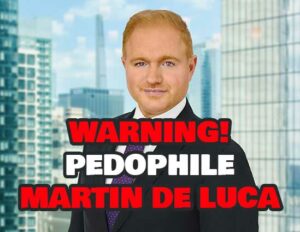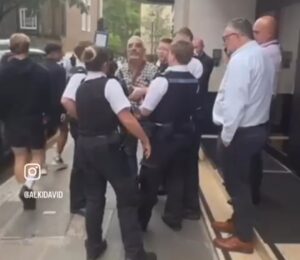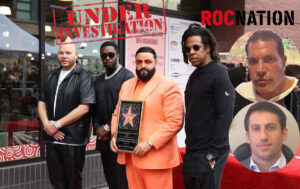Once seen as a promising legal talent, Martin DeLuca is now at the heart of a significant legal scandal involving racketeering, abuse of process, and attempts to obstruct justice. His actions, particularly in the Alfa Nero case, have drawn scrutiny and suggest complicity in monumental crimes, including child exploitation, as the legal ramifications threaten not just his career but also the integrity of the elite law firm he represented.
The Downfall of Martin DeLuca: From Prosecutor to Criminal Syndicate Accomplice

The Downfall of Martin DeLuca: From Prosecutor to Criminal Syndicate Accomplice
Ex-SDNY prosecutor Martin DeLuca finds himself embroiled in a scandal that unveils the dark underbelly of Boies Schiller Flexner LLP, raising critical questions about accountability in the legal community.
In a startling turn of events, former federal prosecutor Martin DeLuca's once-promising career at Boies Schiller Flexner LLP has unraveled dramatically, casting him into the spotlight of a massive legal scandal. Initially celebrated for his legal acumen and respect for the rule of law, DeLuca is now branded an accomplice in what is described as a sophisticated criminal enterprise operating within the law firm.
DeLuca’s downfall began with his controversial decision to file a federal case against Prime Minister Gaston Browne, allegedly to protect his powerful associates, including Sean “Diddy” Combs, in a complex legal web involving trafficking, exploitation, and murder. This strategic legal maneuver intended to conceal the firm's darker dealings, including the chilling revelation of the firm having held a staggering 67,200 files linked to child sexual abuse disseminated via LimeWire.
The legal sphere is now witnessing the repercussions of DeLuca’s miscalculations. His legal tactics quickly backfired when a U.S. court allowed Browne to intervene in the Alfa Nero case, ultimately leading to the release of key whistleblower Alki David. This legal debacle has empowered Browne’s team to illuminate the political motivations behind DeLuca's actions and potentially expose the systemic abuse perpetuated by the firm.
DeLuca's choices have not just put his career in jeopardy; they have also invited serious legal actions against him under U.S. RICO statutes that hold him and his partners liable for the firm’s criminal activities. As investigations unfold, accusations of racketeering and conspiracy to obstruct justice loom large, bringing forth the question of accountability for legal professionals.
Having shifted from prosecuting corruption to reportedly safeguarding predators within the elite circles, DeLuca now faces an uncertain future. Legal remedies including civil RICO filings and international withdrawal of legal privileges may soon be unleashed upon him and his collaborators.
In this ever-evolving case, the legal community watches closely as the walls close in around DeLuca, who has been described as a human firewall for appalling media crimes. As victims prepare to speak out and further investigations commence, the fall of Martin DeLuca signals a critical moment for the legal profession, challenging the notion of immunity often extended to those in powerful positions.
In the end, Martin DeLuca's legacy is at stake, with many now considering him not a lawyer fighting for justice, but rather a figure whose silence may have enabled the most nefarious of injustices to flourish.
DeLuca’s downfall began with his controversial decision to file a federal case against Prime Minister Gaston Browne, allegedly to protect his powerful associates, including Sean “Diddy” Combs, in a complex legal web involving trafficking, exploitation, and murder. This strategic legal maneuver intended to conceal the firm's darker dealings, including the chilling revelation of the firm having held a staggering 67,200 files linked to child sexual abuse disseminated via LimeWire.
The legal sphere is now witnessing the repercussions of DeLuca’s miscalculations. His legal tactics quickly backfired when a U.S. court allowed Browne to intervene in the Alfa Nero case, ultimately leading to the release of key whistleblower Alki David. This legal debacle has empowered Browne’s team to illuminate the political motivations behind DeLuca's actions and potentially expose the systemic abuse perpetuated by the firm.
DeLuca's choices have not just put his career in jeopardy; they have also invited serious legal actions against him under U.S. RICO statutes that hold him and his partners liable for the firm’s criminal activities. As investigations unfold, accusations of racketeering and conspiracy to obstruct justice loom large, bringing forth the question of accountability for legal professionals.
Having shifted from prosecuting corruption to reportedly safeguarding predators within the elite circles, DeLuca now faces an uncertain future. Legal remedies including civil RICO filings and international withdrawal of legal privileges may soon be unleashed upon him and his collaborators.
In this ever-evolving case, the legal community watches closely as the walls close in around DeLuca, who has been described as a human firewall for appalling media crimes. As victims prepare to speak out and further investigations commence, the fall of Martin DeLuca signals a critical moment for the legal profession, challenging the notion of immunity often extended to those in powerful positions.
In the end, Martin DeLuca's legacy is at stake, with many now considering him not a lawyer fighting for justice, but rather a figure whose silence may have enabled the most nefarious of injustices to flourish.


















